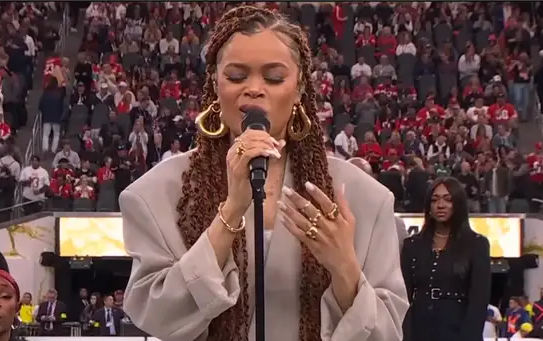Once more, the “Black National Anthem,” also known as “Lift Every Voice and Sing,” made an appearance at Super Bowl LVIII, following a trend observed in recent Super Bowl events. However, this year’s rendition faced a noticeable difference from previous years: a subdued reaction from the crowd.
Unlike past performances, singer Andra Day’s rendition did not receive significant applause from the large audience gathered for the premier football event of the year. After Day’s performance ended, the camera captured a mixed reaction among attendees. While some individuals applauded, their response lacked enthusiasm. Meanwhile, others remained silent or seemed disengaged, with some even looking at their phones during the performance.
In contrast, Reba McEntire’s rendition of the traditional national anthem received much more enthusiastic applause. This contrast raises questions about the NFL’s choice to include multiple anthems in its events. Despite the significance of “Lift Every Voice and Sing” and its expression of Christian-conservative values, its inclusion alongside the national anthem has sparked debate.
While “Lift Every Voice and Sing” holds deep meaning and symbolism, its incorporation into sporting events arises from a broader socio-political context. Some see its inclusion as a response to perceived racial injustices and as reflective of efforts to address systemic issues. However, critics argue that this approach deepens divisions rather than fostering unity.
While acknowledging the importance of recognizing diverse cultural contributions, supporters of a single national anthem advocate for unity and inclusivity. They argue that emphasizing a single anthem symbolizes the shared values and aspirations of the American people, transcending racial or ethnic differences.
Indeed, the United States, despite its flaws, has historically championed individual freedoms and opportunities. Celebrating a single national anthem reaffirms the nation’s commitment to unity amidst diversity, encapsulating the collective pursuit of the American dream.
The proliferation of additional anthems tailored to specific racial or ethnic groups risks further polarization and division. Rather than promoting inclusivity, this approach reinforces distinctions and undermines efforts to foster national unity.
While “Lift Every Voice and Sing” holds cultural significance and deserves recognition, its integration into sporting events should not overshadow the importance of a unified national identity. Embracing a single national anthem underscores the shared values and aspirations that unite Americans across diverse backgrounds.
Ultimately, the debate surrounding the inclusion of multiple anthems reflects broader discussions about identity, representation, and unity in contemporary society. As the nation grapples with complex social issues, embracing a collective national identity remains crucial for fostering understanding and solidarity among all Americans.
